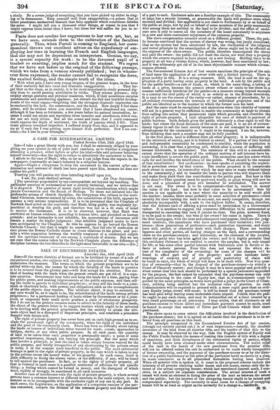A CASE FOR ECCLESIASTICAL CASUISTS.
United Servir..e Club, 24th April 1849. Sin—I take a great liberty with you, but I shall be extremely obliged by your giving me your opinion in one of your next numbers, as to whether a clergyman attending a prisoner, either before or after his trial—this said prisoner behaving himself reverently—has the right to refuse to administer the sacrament to him.
I allude to the case of Rush ; who, so far as I can judge from the reports in the newspapers, (outwardly at least) behaved in a religious manner.
Again—Ought a clergyman to deny the sacrament to the convict after con- demnation and sentence of death has been passed upon him, because he does not confess his guilt?
Trusting you will pardon my thus intruding myself upon you,
[The questions propounded by our correspondent are beyond lay handling. The particular question of ecclesiastical law is strictly technical, and we believe that it is disputed. The question of moral right involves considerations which might puzzle Convocation and the Bench of Bishops. To those not initiated into the profounder arcane of church discipline, the clergyman who refuses to the mori- bund Christian, however stained by crime, the consolations of his faith, appears to assume a very serious responsibility. It is to be presumed that the Chaplain of Norwich Gaol acted on the conviction that Rush, being guilty, was impiously hy- pocritical in denying his guilt, and therefore was not in a fit state of mind to receive the sacrament. It is to be observed, however, that Rush was convicted on human evidence, according to human laws, and punished on human grounds; and as humanity is not infallible, his asseverations of innocence still remain a matter for higher judgment: that infallible judgment seems to have been anticipated by the Chaplain. In this he appears to go beyond the Roman Catholic Church : but then it might be answered, that the rite of confession at once places the Roman Catholic sinner in closer relations to his priest, and per- mits a wider separation between the worldly treatment of a condemned culprit and the spiritual treatment of one among a multitude of sinners. But we are not sure that the course taken by the Norwich Chaplain places the difference of discipline between the two churches in the light most favourable to our own.—E.3


























 Previous page
Previous page